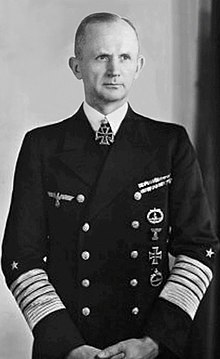Karl Dönitz
Karl Dönitz (pronounced [ˈdøːnɪts] ![]() (help·info); 16 September 1891 – 24 December 1980) was a German naval leader. He commanded the German Navy (Kriegsmarine) during the second half of World War II. Dönitz was also President of Germany[1] for 23 days after Adolf Hitler's suicide.[2] For his role in World War II, Dönitz was referred to as "der Löwe" (the Lion).[3]
(help·info); 16 September 1891 – 24 December 1980) was a German naval leader. He commanded the German Navy (Kriegsmarine) during the second half of World War II. Dönitz was also President of Germany[1] for 23 days after Adolf Hitler's suicide.[2] For his role in World War II, Dönitz was referred to as "der Löwe" (the Lion).[3]
Karl Dönitz | |
|---|---|
 Dönitz as Grand Admiral in 1943 | |
| 4th President of Germany | |
| In office 30 April 1945 – 23 May 1945 | |
| Preceded by | Adolf Hitler Führer und Reichskanzler |
| Succeeded by | Allied military occupation 1945-1949 Theodor Heuss (FRG) Wilhelm Pieck (GDR) |
| Personal details | |
| Born | 16 September 1891 Berlin, German Empire |
| Died | 24 December 1980 (aged 89) Aumühle, near Hamburg, West Germany |
| Nationality | German |
| Political party | None |
- The title of this article contains the character ö. Where it is unavailable or not wanted, the name may be written as Karl Doenitz.
Dönitz was born in Berlin. He entered the Imperial German Navy (Kaiserliche Marine) in 1911. During World War I, he served on surface ships. Later he was transferred to submarines (U-boats). He remained in the navy after the war and rose through the ranks of the German Navy of the Weimar Republic (Reichsmarine) and the German Navy of the Third Reich (Kriegsmarine). He became a Großadmiral. He served as Commander of Submarines (Befehlshaber der Unterseeboote, B.d.U.). Later, he became Commander-in-Chief of the German Navy (Oberbefehlshaber der Kriegsmarine). He got this position, even though he never joined the Nazi Party. Under his command, the U-boat fleet fought the Second Battle of The Atlantic. He also served as Reichspräsident for 23 days after Adolf Hitler's suicide. He ended the war as a prisoner-of-war of the British.
After the war Dönitz was charged and convicted of "crimes against peace" and "war crimes" at the Nuremberg Trials. He served ten years in prison. He ordered the unrestricted submarine warfare which was done by Germany in the North Atlantic. With this, he caused Germany to be in breach of the Second London Naval Treaty of 1936. At his trial, evidence was shown that the Allies had acted similarly. For this reason, this breach of international law had no impact on his sentence.[4][5] After his release from prison, Dönitz moved to Aumühle, a small village near Hamburg. During his later years, he wrote two autobiographies. In them, he covered different periods in his life. He died of a heart attack on Christmas Eve, 1980.
References
change- ↑ "Biography of Karl Dönitz". Archived from the original on 2008-09-16. Retrieved 2009-07-25.
- ↑ "Karl Dönitz's biography". Archived from the original on 2012-07-12. Retrieved 2009-07-26.
- ↑ Time Magazine. The Lion is out Archived 2013-08-24 at the Wayback Machine. Retrieved November, 2007
- ↑ Judgement: Dönitz Archived 2012-08-19 at the Wayback Machine the Avalon Project at the Yale Law School.
- ↑ In addition, Dönitz in Ten Years & Twenty Days and Edward P. Von der Porten in The German Navy in World War Two argue that by being armed and reporting the position of submarines to Royal Navy forces, British merchantmen placed themselves beyond the protection of international law.